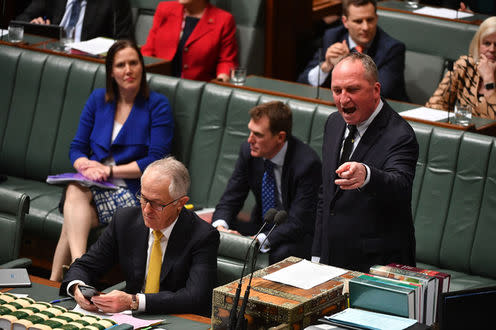How a dual citizenship row ensnared Australian MPs and caused headaches for PM Turnbull

The wafer-thin majority of Australian prime minister Malcolm Turnbull’s government is under threat from a constitutional crisis. A series of high-profile MPs, including the deputy prime minister and another government minister, may lose their seats in parliament after revelations that their citizenship of other countries may disqualify them under Australia’s constitution.
Resources minister Matt Canavan resigned from Cabinet in late July after it emerged he had dual citizenship with Italy. The Australian Constitution is clear in disqualifying anyone who holds foreign citizenship to serve in the national parliament.
As Section 44(i) states, any individual is disqualified if they are:
under any acknowledgement of allegiance, obedience, or adherence to a foreign power, or is a subject or a citizen or entitled to the rights or privileges of a subject or a citizen of a foreign power.
While Australia became a federation in 1901, Australian citizenship came into effect after the end of World War II. Prior to 1949, Australians could only hold the status of British subjects. Challenges to the eligibility of parliamentarians on the grounds of their citizenship have been a feature of Australian politics for the past 30 years, with the High Court responsible for determining cases.
The first of these cases was in 1987. Robert Wood, who was elected to the Senate as a member of the Nuclear Disarmament Party, was disqualified when it was revealed he was a British subject permanently residing in Australia and had not taken up Australian citizenship.
In 1998, another minor party candidate was disqualified from taking her place in the Senate. Heather Hill, from Pauline Hanson’s One Nation Party, was deemed ineligible to be a senator as she held dual citizenship of Australia and the United Kingdom.
What’s happening now?
Prior to this year, citizenship scandals only involved new minor party candidates. But when senators Larissa Waters and Scott Ludlam, both from the Australian Greens, resigned after realising they held dual citizenship, it appeared that Section 44 would begin to have a bigger impact on national politics.
The problem was that both senators were born overseas. Waters was born in Canada and had moved to Australia with her family as an 11-month-old, while Ludlam migrated to Australia from New Zealand when he was eight years old. The fact that they had not renounced their citizenship of the countries in which they were born made them ineligible to be senators.
Questions are now being asked about the eligibility of members of the Liberal and National Party coalition government and at least five MPs face the prospect of being disqualified and ejected from parliament. The list includes senators and members of the House of Representatives.
The biggest name involved is Barnaby Joyce who, as leader of the National Party – which governs in coalition with Turnbull’s Liberal Party – is the deputy prime minister. Joyce discovered that he holds New Zealand citizenship by descent.
While shifts in the representation in the Senate won’t break Turnbull’s government, losing a lower house MP may be disastrous. This is because the government has the slimmest of majorities, holding 76 of the 150 seats in the House of Representatives. Losing just one MP will deprive the government of its outright majority.
It must be remembered that if Joyce, or another lower house MP is disqualified, a byelection will be held and the government may yet win such a contest. In the case of a senator being disqualified, it is often the case that another person from the same party will replace them.
Is ignorance an excuse?
Section 44 was designed to stop those with agendas of foreign governments from entering parliament. The cases where parliamentarians were born overseas and had not renounced their citizenship are, while devastating for the MPs in question, clear-cut in terms of the Constitution.
The recent cases of foreign citizenship being conferred to Australians through descent is a more vexing issue. But the Constitution remains clear in that it will disqualify people in such circumstances as they technically hold dual citizenship. The fate of those MPs with questions about their citizenship will now rest with the High Court and its interpretation of the cases.
Where to now?
While this section of the Constitution appears in desperate need of reframing, changing the document is notoriously difficult. A referendum must be held in which a majority of voters and a majority of states vote to change the Constitution. There have been 44 referendums in Australia and just eight have been successful.
While questions about the citizenship of Australian MPs will be determined by the High Court in due course, this period of instability is highly problematic for the Turnbull government, whose legislative and policy agenda are being sidelined by questions about the eligibility of those in parliament.
This article was originally published on The Conversation. Read the original article.

Zareh Ghazarian does not work for, consult, own shares in or receive funding from any company or organisation that would benefit from this article, and has disclosed no relevant affiliations beyond the academic appointment above.

 Yahoo News
Yahoo News 